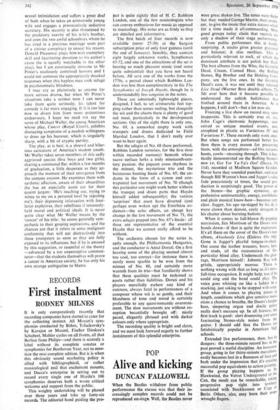RECORDS
First instalment
RODNEY MILNES
It is only comparatively recently that recording companies have started to cater for the collecting instinct. All Mozart's sym- phonies conducted by Bohm, Tchaikovsky's by Karajan or Maazel, Fischer Dieskau's Schubert, Mahler cycles on all fronts, all that Berlioz from Philips—and there is scarcely a label without its complete sonatas or symphonies for Beethoven Year, not to men- tion the DGG complete edition. But it is when this obviously sound marketing policy is allied with bibliographical, or rather musicological zeal that excitement mounts, and Decca's enterprise in setting out to record every single one of Haydn's 106 symphonies deserves both a warm critical welcome and support from the public.
This weighty undertaking will be phased over three years and take up forty-six records. The editorial hand guiding the pro. ject is quite rightly that of H. C. Robbins Landon, one of the few musicologists who can convey enthusiasm for music as opposed to musicology. His notes are as lively as they are detailed and informative.
The first batch of four records is now available (HDNF 27-30) at the bargain
subscription price of only four guineas (until the end of January). Sensibly, they contain eight largely unknown works, Symphonies 65-72, and one of the attractions of the set is hearing so much pleasant music (and some quite substantial) that you have not heard before. All save one of the works from the 1770s, a period about which Robbins Lan- don was less than complimentary in his The Symphonies of Joseph Haydn, though he is understandably less sanguine in the notes.
These are admittedly lightweight pieces, designed, I feel, to set aristocratic feet tap- ping rather than senses reeling, but alongside the wit and the charm there is plenty of good red meat, particularly in the development sections. Out of the eight there is only one, No. 69, a somewhat empty work with trumpets and drums dedicated to Field Marshal Loudon, that I don't really ever want to hear again.
But the adagio of No. 68 (here performed, Robbins Landon surmises, for the first time within recorded memory) beneath whose suave surface lurks a truly nineteenth-cen- tury passion; the piquant cross rhythms in the minuet, the mysterious trio and the boisterous hunting finale of No. 65; the an- dante in the form of a canon and con- trapuntal last movement of No. 70 (though this particular one might work better without the trumpet and drum parts that Haydn himself added subsequently); the various `surprises' that must have diverted (and perhaps even woken up) the Esterhaza au- diences—the echo effects, an abrupt key change in the last movement of No. 71, the extra adagio popped into No. 67's finale: all these are representative of the essential Haydn that we cannot really afford to be without.
The orchestra chosen for the series is, aptly enough, the Philharmonia Hungarica, and the conductor is Antal Dorati. On a first hearing some of the playing seemed almost too cool, too correct—for instance there is surely more sparkle to be won from the minuet of No. 66, and certainly more warmth from its trio—but familiarity shows that these qualities must be reckoned as assets rather than liabilities. Dorati and his players mercifully eschew any kind of cuteness, always fatal in performances of a composer whose wit is so gentle, and their blandness of tone and mood is certainly preferable to any quasi-romantic overstate- ment. The slow movements are without ex- ception beautifully brought off : nicely paced, elegantly phrased and with darker colours only where appropriate.
The recording quality is bright and clean, and we must look forward eagerly to further instalments of this splendid enterprise.


































 Previous page
Previous page